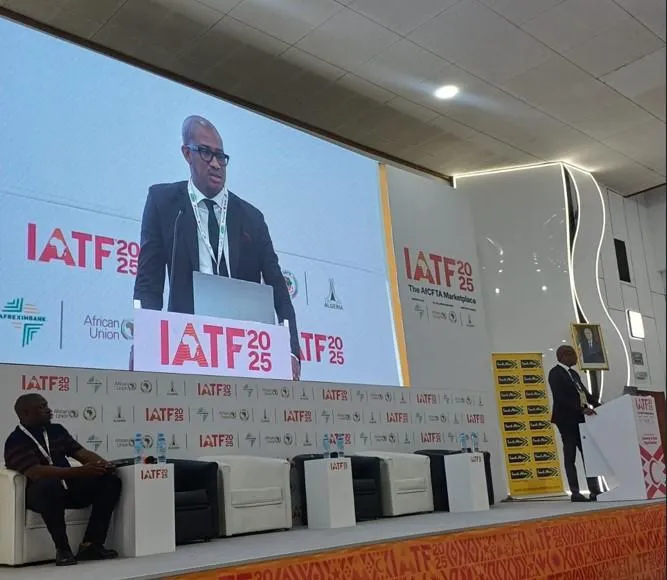
Deputy Minister in the Presidency, Kenny Morolong, speaking at an automotive dialogue organised by Brand South Africa during the Auto Forum at the Intra-African Trade Fair in Algeria on Saturday. On stage with Morolong was Jimmy Ranamane, general manager for global markets at Brand SA.
Image: Siphelele Dludla/Independent Newspapers
Deputy Minister in the Presidency, Kenny Morolong, has raised alarms regarding the surge of illegally imported second-hand vehicles flooding the South African market.
Morolong said this trend was critically undermining the nation's efforts to establish a thriving New Energy Vehicle (NEV) sector and adversely affecting country’s potential contributions to intra-African trade.
As the world pivots towards greener alternatives in the automotive industry, South Africa has committed to enhancing its manufacturing capabilities for NEVs, which include electric and hybrid vehicles.
This commitment aligns with global environmental goals and economic aspirations, positioning the country as a potential leader in sustainable automotive production within the African continent.
Speaking at an automotive dialogue organised by Brand South Africa during the Auto Forum at the Intra-African Trade Fair in Algeria on Saturday, Morolong said the rampant entry of these second-hand vehicles poses a formidable barrier.
Morolong’s remarks highlighted a critical challenge faced by local manufacturers striving to innovate and compete in a burgeoning market that increasingly values sustainability.
“The promise of a New Energy Vehicle is within our grasp, but our progress is hampered by a persistent challenge, the flood of illegally imported second-hand vehicles. It is estimated that on our roads, there are over half a million illegally imported vehicles,” Morolong said.
“To put this in perspective, if these vehicles were a single brand, they would be the third most popular brand in our country's new vehicle market.
“This illegal trade is not just a statistic, it is a direct attack on our economy. It drops our fees between R5 billion and R8bn every year in lost taxes. It undermines our local manufactures and holds back our industrial development.”
The rampant issues surrounding these vehicles, often referred to as "grey imports," have transformed South Africa into a dumping ground for approximately 30 000 substandard used cars from neighbouring countries like Lesotho and Eswatini.
Recent statistics from the Automobile Business Council reveal that grey imports are costing the South African Revenue Service nearly R8bn each year, marking a staggering increase of 110% from R3.8bn in 2020.
The losses can be attributed to evaded import duties, value-added tax, and other taxes commonly bypassed through smuggling or the illegal importation of vehicles.
In light of these troubling circumstances, Morolong urged for ramping up in the implementation of the continental trade agreement.
“This is precisely why the African Continental Free Trade Area (AfCFTA) is more than just a trade agreement. It carries the hopes and aspirations of our entire continent. The AfCFTA is our tool to foster local production, to spur innovation and to accelerate development,” he said.
“It is our collective vehicle to move Africa beyond fewer than one million vehicles a year to become a global competitive automotive powerhouse. Now let us be clear about South Africa's commitment and our value proposition.
“The automotive industry is the heartbeat of South Africa's manufacturing sector. It is our largest manufacturing sub-sector, contributing nearly 5% to our GDP and supporting close to half a million jobs from the factory floor to the showroom.”
Morolong said their goal at the IATF2025 was to showcase the strength of South Africa's automotive industry, highlighting the country's world-class manufacturing capabilities, attractive incentives, and to call for greater collaboration across the continent.
"While other major African markets saw declines, our domestic new vehicle sales grew by an impressive 17.5%. We sold over half a million new vehicles in 2022. These results point to the underlying strength of our industry," he said.
"Our ambitious Automotive Master Plan 2035 sets a goal target to produce 1.4 million vehicles annually by the end of 2035. This will secure us 1% of the global market. To get there, we have created an attractive and stable policy environment. Programmes like the Automotive Production Development Programme are designed to stimulate local production and reward export competitiveness.
"We are not blind to the challenges from global supply chain disruptions to economic pressures, but our industry is repeatedly improving its resistance. Our government's long-term vision and consistent policies provide the second trigger for continued investment and growth.
"In summary, South Africa's automotive industry is open for business. We are a strategic gateway to Africa, powered by skilled workforce, robust infrastructure and our unwavering commitment to growth and sustainable business. Through the AfCFTA, we can integrate our markets, amplify our strength and build an automotive industry that competes and wins on the world stage."
BUSINESS REPORT